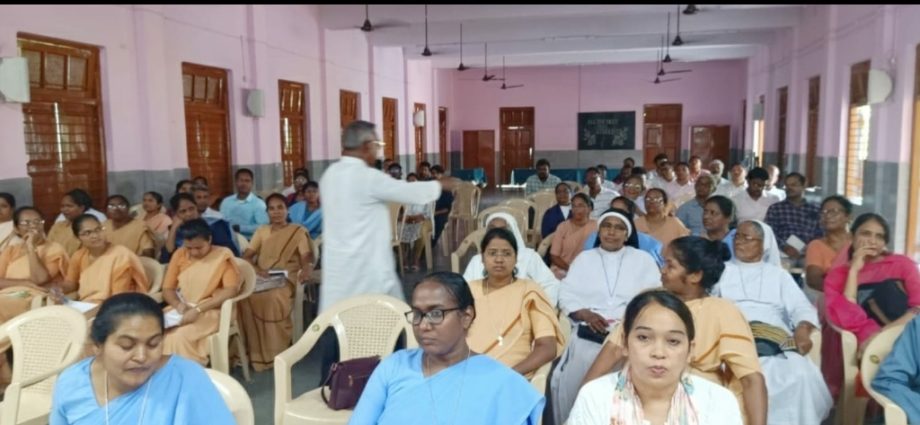By Sujata Jena
Bhubaneswar, May 20, 2024: A seminar on hope-filled nation-building from a synodal church perspective was held in Bhubaneswar capital of the eastern Indian state of Odisha.
The May 18 event was organized by the Odisha Region Catholic Religious of India (CRI) in collaboration with church leaders and human rights activists.
As many as 85 religious clergy, church leaders, advocates, and human rights activists from various dioceses attended.
The seminar started with a keynote address by Sister Helen Saldana, the director of Streevani (the voice of women), Pune.
She emphasized the significant role that faith communities can play in nation-building by shaping the moral and ethical framework of society. Sister Saldana’s address set the tone for the day’s discussions, highlighting the intersection of faith, ethics, and civic responsibility.
The main resource persons for the seminar were Jesuit Father Prakash Louis and civil and human rights activist Dhirendra Panda.
Panda provided a comprehensive analysis of the current socio-political landscape, both locally and nationally, emphasizing the importance of safeguarding constitutional values and protecting fundamental rights.
Father Prakash, a human rights activist and author of several books, led the participants through action-oriented reflections.
He urged the participants, “to wake up, prepare, and participate in the 2024 general election processes and the outcome.”
Father Prakash stressed the need to save the Constitution, country, and citizens. “We need to uphold the rights of Dalits, Tribals, Backward Castes, and minorities,” he added. He called for fight against and promotion of peace and harmony among all citizens.”
Organizers, Jesuit Father Alex Arulandam, the Secretary of CRI Odisha region, and human rights activist Father Ajay Kumar Singh, engaged participants in dynamic group work sessions.
The sessions focused on strategic planning at both micro and macro levels. They planned to support efforts beyond church walls and make a impact on nation-building.
The participants planned:
– Engage in voter ID campaigns to register new voters, including those who have lost their IDs, been denied, or changed their address.
– Each participant will organize campaigns to motivate people to exercise their franchise.
– Gather the right information and knowledge to conscientize others.
– Prepare, print, and distribute handbills and social media clips on issues such as price rises, unemployment, poverty amidst plenty, displacement, and distressed migration.
– Prepare street plays to present the issues affecting common people.
– Organize workshops and seminars on the constitution to deepen the understanding of Ambedkar’s model.
– Identify and highlight real issues of the common masses, whether local, constituency-based, state-wide, or national, and prepare report cards on the state and central governments they aim to challenge post-election.
– Identify and network with multiple agencies, individuals, and institutions of pro-democratic and pro-citizen parties.
Father Arulandam highlighted the importance of grassroots engagement and the role of faith-based organizations in driving social change. “Our work must reach beyond the confines of our churches and touch the lives of those in need, fostering a spirit of inclusivity and justice,” he said.
Father Singh encouraged participants to leverage their networks and resources to advocate for policy changes and community initiatives that uphold human rights and dignity.










